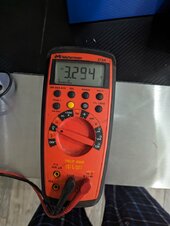You are using an out of date browser. It may not display this or other websites correctly.
You should upgrade or use an alternative browser.
You should upgrade or use an alternative browser.
EVE 304ah came in
- Thread starter Nonlin
- Start date
Ohh could you provide some clarity?That's not how you supposed to measure resistance
hwy17
Anti-Solar Enthusiast
Don't try to test, just build.
A multimeter uses DC to measure the impedance, but the voltage in the battery messes with the results. An Impedance tester uses AC, usually around 1Khz, to make the measurement. Testers like the YR1030 and YR1035 do an okay job, but they're not lab instruments. You're likely to get different readings than specified for the batteries, which will only annoy you. I agree with the above - just build.
Ah ok, didn't know that. Isn't a range / accuracy issue? Does it mean absolutely nothing?You can't measure battery impedance with regular multi meter. You need special battery impedance tester for that.
hwy17
Anti-Solar Enthusiast
IR testers apply a known load during measurement. It's a dark art. Even with the correct equipment, results are not directly comparable between different equipment and methodologies.Ah ok, didn't know that. Isn't a range / accuracy issue? Does it mean absolutely nothing?
Factories have advanced equipment and then run the same exact test on different cells and then their results are useful, because the test equipment and methodology is a controlled factor.
Would be nice if they gave a test sheet for the batteries with the results of their testingIR testers apply a known load during measurement. It's a dark art. Even with the correct equipment, results are not directly comparable between different equipment and methodologies.
Factories have advanced equipment and then run the same exact test on different cells and then their results are useful, because the test equipment and methodology is a controlled factor.
hwy17
Anti-Solar Enthusiast
18650 provides test reports I thought. But who can trust a spreadsheet anyway. Buy from a reputable seller, which you did, check your QR codes aren't sanded, which they're probably not, then build and see how many kwh's you get. That's the test, build it and use it.Would be nice if they gave a test sheet for the batteries with the results of their testing
Partimewages
Solar Addict
Just FYI
Please take some time to read over the many tutorials building your batteries. There is many things your going to need to do to be successful.
Please take some time to read over the many tutorials building your batteries. There is many things your going to need to do to be successful.
houseofancients
Solar Wizard
What are you w
Did you order a grade or b grade ?
What are you worried about ?Would be nice if they gave a test sheet for the batteries with the results of their testing
Did you order a grade or b grade ?
hardtop
New Member
Peel back the top black cover and check for serial numbers scratched off.
SupraSPL
Solar Enthusiast
- Joined
- Aug 28, 2022
- Messages
- 222
In my experience 18650 does not over promise. I dont think you will be disappointed.
For a quick gauge of capacity, if they are sitting at 40% SOC right now, you should see that it takes an appropriate amount of kWh to reach full charge. Once decently top balanced, they should stay very well balanced even with a small passive balancer.
For a quick gauge of capacity, if they are sitting at 40% SOC right now, you should see that it takes an appropriate amount of kWh to reach full charge. Once decently top balanced, they should stay very well balanced even with a small passive balancer.
This would be also my recommendation. Start with some theory before going much further with your build. Huge lithium batteries are not the best starting point to beginner, some precaution is recommended.Just FYI
Please take some time to read over the many tutorials building your batteries. There is many things your going to need to do to be successful.
Your mishap with the multimeter was rather harmless but someone could also attempt to measure amp-hours with the multimeter current range by shorting the battery with the multimeter.
I used a multimeter to test the impedance of the 3.2V lifepo4 battery, and it showed 15mΩ. But I used an impedance tester to measure it before, and it was 0.21mΩ. Amazing!
And the seller told me that it is correct to use an Impedance tester to test. But she didn't tell me the reason.

And the seller told me that it is correct to use an Impedance tester to test. But she didn't tell me the reason.
EastFalcon
New Member
Sand off the top layer to remove the anodizing you will get much better results. These terminals have a thick layer of anodizing that adds resistance.
Similar threads
- Replies
- 3
- Views
- 283
- Replies
- 3
- Views
- 175
- Replies
- 113
- Views
- 8K
- Replies
- 23
- Views
- 594
- Replies
- 1
- Views
- 120




